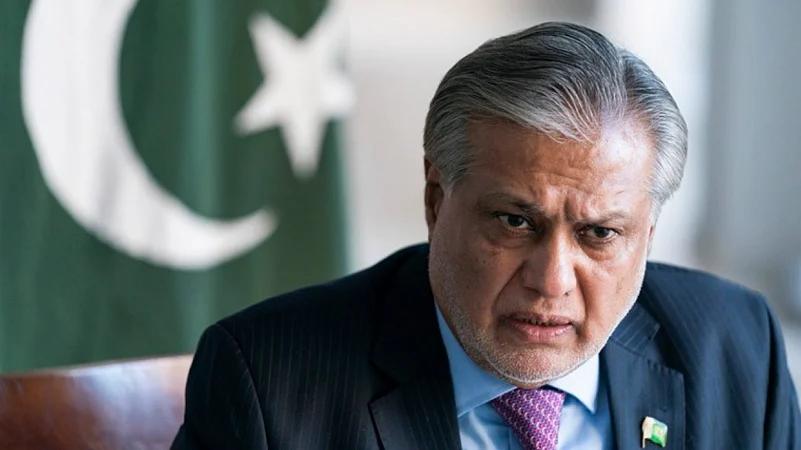Pakistan’s Deputy Prime Minister and Foreign Minister Ishaq Dar sending a “positive message” to India on Tuesday said his country does not believe in “perpetual hostility” and urged the new government in New Delhi to do a “sober reflection” on its future ties with Islamabad.
In Message To India, Pak Deputy PM Dar Says His Country Doesn’t Believe In ‘Perpetual Hostility’
To our east, the relationship with India has historically remained troubled, Pakistan’s Deputy Prime Minister and Foreign Minister Ishaq Dar said, adding that his country 'does not believe in perpetual hostility'

Addressing a seminar at the Institute of Strategic Studies Islamabad (ISSI), the 74-year-old Pakistan Muslim League-Nawaz (PML-N) leader said Pakistan always sought “good neighbourly relations”.
“To our east, the relationship with India has historically remained troubled. Pakistan does not believe in perpetual hostility. We seek good neighbourly relations with India on the basis of mutual respect, sovereign equality, and a just and peaceful resolution of the long-standing Jammu and Kashmir dispute,” Dar said.
The foreign minister said while Pakistan had always been receptive to constructive engagement through dialogue that includes all outstanding issues, Pakistan would never agree to “unilateral approaches or attempts to impose India’s will or hegemony”.
Pakistan downgraded its ties with India after the Indian Parliament suspended Article 370 on August 5, 2019, a decision that Islamabad believed undermined the environment for holding talks between the neighbours.
India has been maintaining that it desires normal neighbourly relations with Pakistan while insisting that the onus is on Islamabad to create an environment that is free of terror and hostility for such an engagement.
Pakistan will also take every step needed to maintain strategic stability in South Asia and would respond effectively and decisively to any ill-considered military misadventure by India, he said.
Dar also urged the BJP-led government to have a reflection of ties with Pakistan.
“In our view, as the BJP-led NDA government starts a new term, it is time for a sober reflection on the future of India-Pakistan relations and the cross-cutting issues affecting the entire region,” Dar said.
He said, “India’s illegal and unilateral actions of August 5, 2019, had adversely affected the environment of bilateral relations”.
“The onus remains on India to take necessary steps to create an enabling environment for purposeful engagement and result-oriented dialogue on all issues,” he stressed.
“South Asia is home to more than one-fifth of humanity. The region is beset by daunting challenges, including poverty, unemployment, illiteracy, disease, food insecurity, water scarcity, natural disasters, environmental degradation, and effects of climate change,” he further said.
“Rather than fight with each other, it would be prudent for the South Asian nations to combat these challenges. We are not only the least economically integrated region, but also one with the lowest rankings on almost all indices of human development,” the minister said.
He claimed that the South Asian Association for Regional Cooperation (SAARC), the only viable platform for regional cooperation and tackling these myriad challenges, remains stymied due to “obstinacy of one member state”.
“The political leadership in South Asia owes it to its peoples and future generations to act with prudence and turn a new page in regional relations and mutual cooperation,” he maintained.
Dar said Pakistan’s approach was conceptualised in the “peaceful neighbourhood” policy.
Pakistan has consistently strived to have peaceful, cooperative and good-neighbourly relations with all countries in our immediate and extended neighbourhoods, Dar claimed.
Despite challenges and even setbacks in certain instances, Pakistan’s approach remains steadfast, he said.
“A peaceful, stable, united, and prosperous Afghanistan is in Pakistan’s vital interest. There are no other two countries in the world that share so much as Pakistan and Afghanistan do – from history and geography to faith and culture to language and literature to cuisine and music,” according to Dar.
He said since the Taliban takeover in August 2021, Pakistan has followed a pragmatic approach – focused on practical cooperation aimed at averting any humanitarian crisis in Afghanistan and facilitating the wellbeing of the 40 million Afghan people.
“Pakistan has also prioritised regional cooperation to ensure that our actions remain in sync with the broader international community. Apart from emphasising inclusive governance and respect for the rights of all Afghans, Pakistan stresses the imperative need to ensure that Afghanistan’s soil is not used for terrorism against any state,” he said.
He said Pakistan earnestly hoped the Afghan Interim authorities would see that it is in their own enlightened self-interest to heed this call and take the practical steps needed to address our serious concerns.
Talking about China, he said Pakistan has its most trusted and reliable friend, China. “Our all-weather strategic cooperative partnership with China is the cornerstone of Pakistan’s foreign policy.”
“It is also a factor of stability in the region and beyond. The China-Pakistan Economic Corridor is a transformational project contributing both to Pakistan’s economic turnaround as well as regional prosperity,” Dar said.
He talked about Prime Minister Shehbaz Sharif’s recent trip to China. “Upon successful completion of 10 years of CPEC, we have jointly agreed to pursue its upgraded version in the coming years. Essentially, our focus would be on industrialisation, digitalisation, green transition, agriculture, and people-to-people exchanges,” he said.
He also said Pakistan would do everything possible to ensure the safety and security of Chinese personnel and projects in Pakistan.
- Previous Story
 Drone Attacks, Prisoner Swap And Alleged North Korean Involvement | Latest On Russia-Ukraine War
Drone Attacks, Prisoner Swap And Alleged North Korean Involvement | Latest On Russia-Ukraine War - Next Story




















